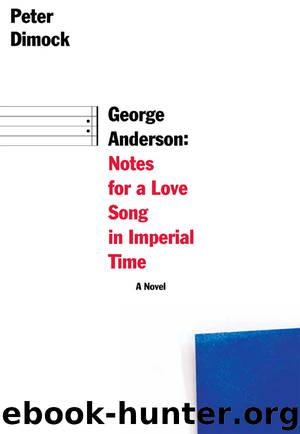George Anderson by Peter Dimock

Author:Peter Dimock
Language: eng
Format: azw3
ISBN: 9781564788016
Publisher: Dalkey Archive Press
Published: 2013-03-05T05:00:00+00:00
FOURTH WEEK
Do you tell yourself our superiority derives from our talents or from our legitimate exercise of immediate rule?
Our wars are not declared. The events resulting from the force our empire requires are not admissible evidence against us. It’s true our frames could hardly bear very much of it. This is how republics end.
In this first cycle of this method’s practice, the fourth week is reserved for the third historical subject. Choose it well. In subsequent cycles, the fourth week’s exercises will be devoted to the practitioner himself as historical subject—to autobiography as self-help—a practical, political guide. During this first cycle, the last two days of your practice may be allotted to the task of beginning to compose musical notes for yourself as historical subject speaking in the first person. But for most, these last two days of the first cycle are better spent reviewing and securing in memory the method’s tables of rules.
The object, when it comes to the fourth week of subsequent cycles, is to dissolve the imperial self and to trust those you find standing at the end of your vision.
In my own practice of this first cycle only, I chose Judith Takes as my historical subject for the fourth week. Again I use a governing scene assembled as a composite made from two moments. The first merges and then gives way to the second in each exercise’s actual practice. It is perfectly acceptable to use moments derived from your reading for your governing scenes rather than actual events. The goal is interpretive immediacy and perfect union between words and things, not legal standards of proof.
For the first moment of my third subject’s governing scene I use a mental picture of a young woman listening to a young man speaking publicly. He is narrating his experience as a child entering history’s literate clarity through what he calls “the bloodstained gates of slavery.” This moment occurs on a New England summer evening in a public meeting hall on Nantucket Island. The year is 1841. The second moment of my third subject’s governing scene comes from Judith’s account to me of the moment she and Jason Frears fell in love. She had gone to hear him play in Greenwich Village club on his birthday. This was in early September of 1963.
Remember that the goal of this method is responsible immediacy for historical thought. These exercises are intended to help rid us of our attachments to empire and undo the consequences of historylessness. (American exceptionalism is not exceptional.)
In philosophy immediacy is an inference drawn from a single premise and therefore arrived at without the intervention of a middle term. Immediate knowledge is the knowledge of self-evidence. We hold these truths.
At Nuremberg it was established as legal doctrine that immoral laws could not make crimes against humanity immune from prosecution. The urgency of universal justice, given the destructive powers unleashed by modernity, is simply too great. Justice within modernity is understood to mean universal entitlement to individual freedom within a society of equal historical selves.
Download
This site does not store any files on its server. We only index and link to content provided by other sites. Please contact the content providers to delete copyright contents if any and email us, we'll remove relevant links or contents immediately.
| African American | Asian American |
| Classics | Anthologies |
| Drama | Hispanic |
| Humor | Native American |
| Poetry | Southern |
Crazy Rich Asians by Kevin Kwan(9279)
How to Bang a Billionaire by Alexis Hall(8146)
Giovanni's Room by James Baldwin(7330)
Win Bigly by Scott Adams(7184)
Little Fires Everywhere by Celeste Ng(7184)
Pachinko by Min Jin Lee(5689)
Tease (Temptation Series Book 4) by Ella Frank(5628)
The Fire Next Time by James Baldwin(5431)
The Perks of Being a Wallflower by Stephen Chbosky(4639)
China Rich Girlfriend by Kwan Kevin(4558)
Bluets by Maggie Nelson(4548)
First Position by Melissa Brayden(4520)
The Sympathizer by Viet Thanh Nguyen(4385)
Rich People Problems by Kevin Kwan(4284)
A Little Life (2015) by Hanya Yanagihara(4278)
Right Here, Right Now by Georgia Beers(4198)
Walking by Henry David Thoreau(3953)
Catherine Anderson - Comanche 03 by Indigo Blue(3621)
The Death of the Heart by Elizabeth Bowen(3610)
